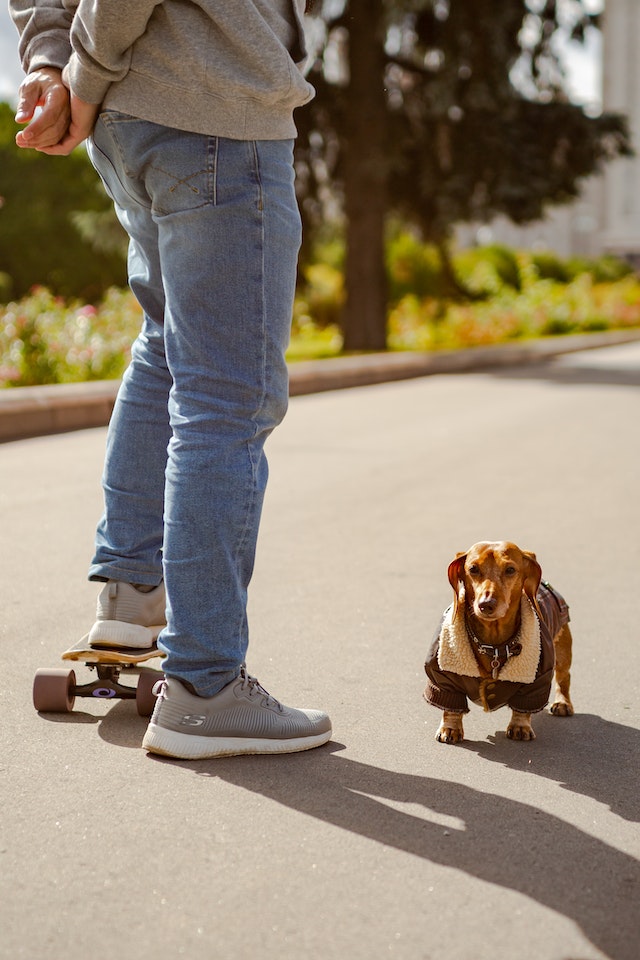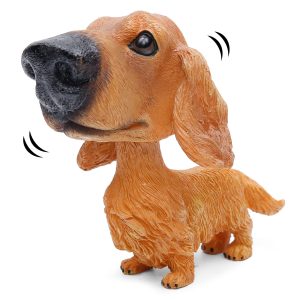Brief Overview of Dachshund Breed
How did dachshunds originate?
Dachshunds, also known as “wiener dogs” or “sausage dogs”, are a popular breed of small dogs originally bred in Germany for hunting badgers. They have a long body, and short legs, and come in three varieties: smooth, wirehaired, and longhaired.
Dachshunds are known for their distinctive bark, loyal personality, and affectionate nature. They can weigh anywhere from 8 to 32 pounds and stand at around 5 to 9 inches tall at the shoulder.
Is Dachshund a Good Dog for Beginners?

We talk now about dogs in general. Choosing the right dog as a beginner is crucial as it can make or break your experience as a pet owner. Some breeds may be too high-maintenance or aggressive for first-time owners while others may be more suitable. It’s important to do your research on different breeds and take into consideration factors such as size, temperament, exercise requirements, and grooming needs before making a decision.
When deciding on getting a dog as a beginner, it’s important to also consider your lifestyle and living situation. Do you live in an apartment or a house?
Do you have other pets? Are there children in the household?
These are all important factors to consider when choosing the right breed that will fit seamlessly into your lifestyle. In the next sections of this article, we will explore whether Dachshunds are suitable dogs for beginners by discussing their characteristics and the pros and cons of owning one as a first-time owner.
Characteristics of Dachshunds
Owning a sausage dog as beginner? If you’re considering getting a Dachshund as your first dog, it’s important to understand the breed’s characteristics. They’re famously known for their elongated bodies and short legs, which give them a unique appearance that sets them apart from other breeds. This unique shape also makes them prone to certain health issues, so it’s essential to know how to care for them properly.
Physical Appearance and Size
Dachshunds come in three different sizes: standard, miniature, and toy. Standard dachshunds typically weigh between 16-32 pounds and stand about 8-9 inches tall at the shoulder.
Miniature dachshunds are smaller and weigh between 8-11 pounds, standing about 5-6 inches at the shoulder. Toy dachshunds are even smaller than miniatures, weighing only around 4-7 pounds while standing about 4-5 inches tall.
Their elongated body can make Dachshunds prone to back problems such as herniated discs or slipped discs. It is recommended that owners take special care when handling their dogs by avoiding lifting them by their midsection or allowing them to jump off high surfaces such as couches or beds.
Temperament and Personality Traits
Dachshunds have a friendly disposition and are known for being affectionate towards their owners. They’re loyal dogs who form strong bonds with their families but can be wary of strangers if not socialized early on in life.
They’re active dogs that require daily exercise but don’t have high energy levels like some other breeds. They can get by with moderate exercise such as daily walks or playtime in the backyard.
Grooming Needs
The smooth-coated Dachshunds have short, shiny hair that requires minimal grooming. Wirehaired Dachshunds have thick, rough coat that needs more grooming and clipping to maintain their shape.
Longhaired Dachshunds have soft and silky fur that needs daily brushing to prevent matting. Overall, Dachshunds make great pets for beginners due to their friendly nature and moderate exercise requirements; however, it’s important to be aware of their unique health concerns and grooming needs.
Affectionate and Loyal Nature
Dachshunds are a breed known for their loyalty towards their owners. They form strong bonds with their family members and are very protective of them. This trait makes them ideal for first-time dog owners who want a companion that will be always by their side.
Dachshunds crave human attention and will often follow their owners around the house, snuggling up to them on the couch or curling up at the foot of the bed at night. Another trait that makes Dachshunds a great choice for beginners is their affectionate nature.
They love to cuddle, give kisses, and get belly rubs from their owners regularly. Dachshunds are often called “velcro dogs” because they like to be close to their humans at all times, making them excellent lap dogs.
Low Maintenance Exercise Requirements
Dachshunds are small dogs that do not require a lot of exercise. They have short legs that make it difficult for them to run long distances or engage in high-intensity activities like other breeds such as Labradors or German Shepherds do. However, they still need daily exercise to stay healthy and happy.
A brisk daily walk around the neighborhood or some playtime in the backyard is enough physical activity for most Dachshunds. This low-maintenance exercise requirement makes them perfect pets for people who have busy schedules or live in apartments where space is limited.
Good Apartment Dogs
Living in an apartment can be challenging when looking for a pet dog due to limited space. However, Dachshunds’ small size makes them great apartment dogs as they can easily fit into any living space without much hassle. They also have minimal shedding compared to other breeds which makes maintenance easier in smaller living spaces; less fur means less cleaning!
As long as you provide your Dachshund with regular exercise and mental stimulation, they will be happy living in an apartment and make great companions for city dwellers. Overall, Dachshunds make excellent pets for beginners due to their affectionate and loyal nature, low-maintenance exercise requirements, and suitability for apartment living.
However, like any other pet, they require proper care and attention to thrive. If you’re considering getting a Dachshund as your first dog, be sure to research the breed beforehand to ensure you can provide them with the love and care they deserve.
The Cons of Owning a Sausage Dog as Beginner
Stubbornness and Difficulty with Training
One of the main cons of owning a Dachshund as a beginner is their stubborn nature which makes them difficult to train. Dachshunds are known for being independent thinkers and they may not always listen to commands, especially if they don’t see the point in doing so.
This can make training difficult and frustrating for inexperienced owners who may not know how to handle this type of behavior. To overcome this challenge, it’s important to establish yourself as the pack leader early on in your relationship with your Dachshund.
Use positive reinforcement techniques such as treats and praise to encourage good behavior, and be consistent with your training methods. It may also be helpful to enroll your puppy in obedience classes taught by professionals who have experience working with stubborn breeds like Dachshunds.
Prone to Health Issues Such as Back Problems
Another potential downside of owning a Dachshund is its susceptibility to health issues, particularly back problems. Due to their long bodies and short legs, Dachshunds are more prone than other breeds to developing spinal issues such as intervertebral disc disease (IVDD). This condition can cause pain, paralysis, and even death if left untreated.
To prevent back problems in your Dachshund, it’s important to take extra precautions when handling them. Avoid picking them up by their stomach or back legs, which can put unnecessary strain on their spine.
Additionally, make sure they maintain a healthy weight through diet and exercise – overweight Dachshunds are at higher risk for IVDD. Overall, while the stubbornness of these dogs might be problematic when it comes time for training or obedience class; by avoiding stressing out their backs too much you can significantly decrease any potential health issues that come along with owning this breed.
Tips for Owning a Sausage Dog as Beginner
Proper Socialization and Training Techniques
Dachshunds can be stubborn and difficult to train, which is why it’s essential to start socializing and training them as early as possible. Socialization involves exposing your dog to different people, animals, and environments to get them comfortable with new situations.
This exposure will make them more confident dogs that are less likely to become anxious or aggressive in new circumstances. Training should start with basic commands like sit, stay, come, and heel.
Positive reinforcement techniques that reward good behavior are best when training Dachshunds. Using food rewards is an effective way of getting their attention since they love food treats.
One important tip is to be patient when training Dachshunds since it can take some time before they grasp what you’re trying to teach them. Consistency is key in the training process so stick with it even when the results aren’t immediate.

Health Considerations to Keep in Mind
Dachshunds are prone to certain health issues such as back problems due to their elongated bodies. It’s crucial always to support their backs by holding or lifting them correctly since injuries can result in paralysis. They may also have dental problems due to their small mouth size; regular dental care like brushing teeth with dog toothpaste can help prevent dental diseases.
It’s advisable only ever feed your Dachshund high-quality dog food that meets their nutritional needs, which vary depending on age, weight, and activity level. Obesity is another health issue that affects dachshunds; keep an eye on your dog’s weight through diet control.
Finding the Right Breeder or Rescue Organization
Choosing the right breeder or rescue organization ensures you get a healthy puppy or adult dog with a good temperament. You can search for reputable breeders online or get recommendations from your vet or local breed clubs.
When seeking to rescue a Dachshund, it’s wise to research different organizations and visit them in person. Look for organizations that have caring and experienced staff who know about the breed and have the dogs’ best interests at heart.
Reputable breeders should offer veterinary health certificates for their puppies that guarantee their health. They should also provide you with a contract outlining the terms of the sale, including any warranties or guarantees.
By following these tips, you can ensure you give your Dachshund a healthy, happy life as a beginner pet owner. Remember always; patience, consistency, and love are key to owning any dog regardless of their breed.
Conclusion
Summary of key points discussed in the article
Dachshunds are a unique breed that may or may not be suitable for beginners. While they have many positive traits such as their affectionate and loyal nature, low maintenance exercise requirements, and being good apartment dogs, they also have some negative aspects to consider such as stubbornness and health issues.
It is important for potential Dachshund owners to do their research and understand the breed’s specific needs before making a decision. Proper socialization and training techniques are crucial for their development, as well as keeping an eye on their health since they are prone to back problems.
Final thoughts on whether or not Dachshunds are good dogs for beginners
Overall, it depends on the individual owner’s lifestyle and experience with dog ownership. For those who have experience with training stubborn breeds or are willing to put in the effort to properly train a Dachshund, they can make wonderful companions. However, for those who prefer a more obedient breed or have limited time for training, it may be best to consider another breed.
Regardless of one’s choice of breed, adopting from a reputable breeder or rescue organization is always recommended. With proper care and attention, any dog can make a loving addition to one’s family!


